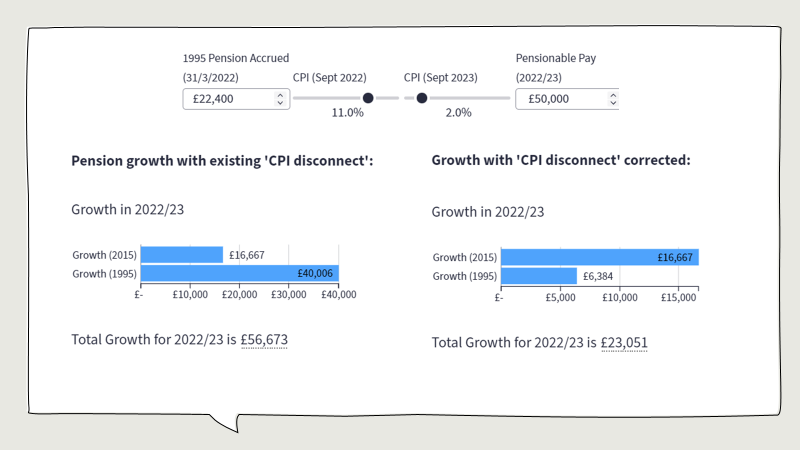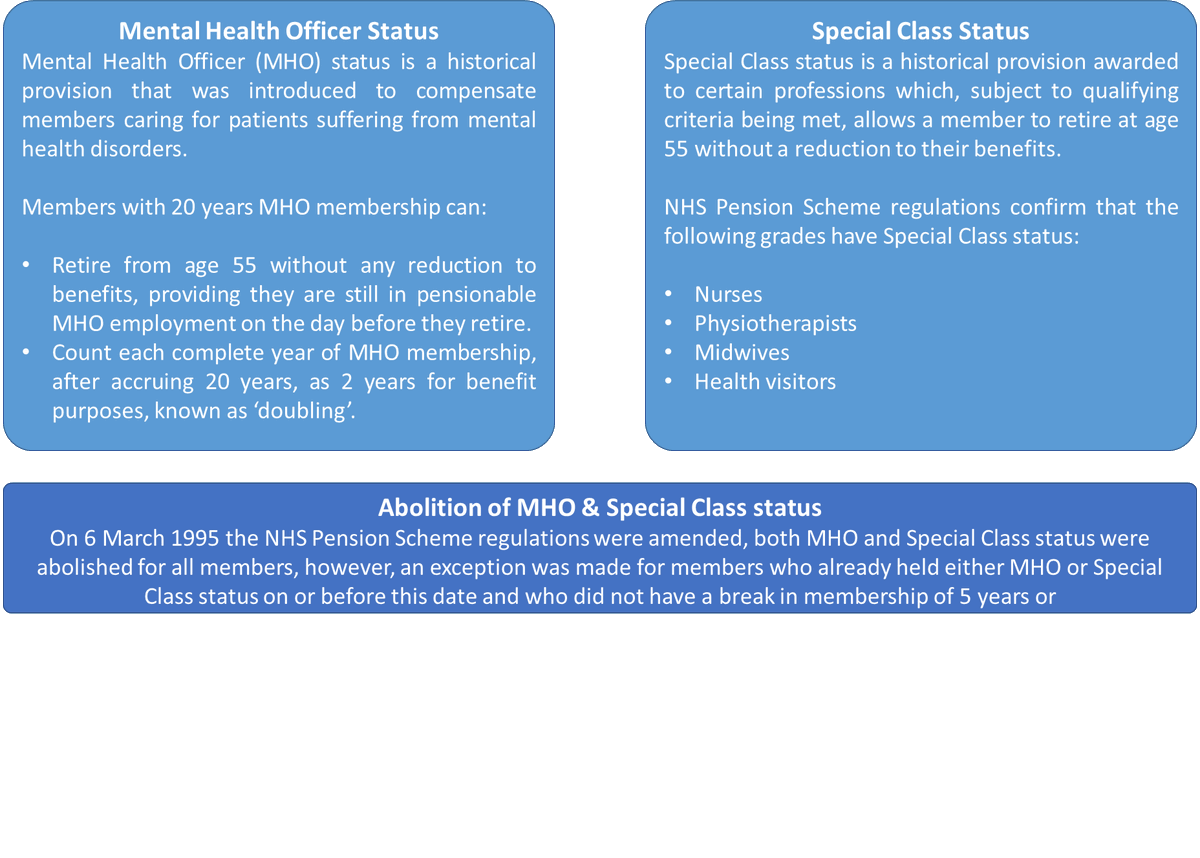1) A thread on Pension Record errors
#MedTwitter - if you've ever had an annual allowance charge, it is worth checking your #nhspension
Lots of good #MedEd threads on this subject from @goldstone_tony
Here's a round up of the major errors, and a few of the niche ones too
#MedTwitter - if you've ever had an annual allowance charge, it is worth checking your #nhspension
Lots of good #MedEd threads on this subject from @goldstone_tony
Here's a round up of the major errors, and a few of the niche ones too
2) Annual Allowance in #nhspension is measured by the growth in the benefits that you've accrued (NOT based on contributions)
Your benefits are based on your pensionable pay
👉If your pensionable pay is wrong, then accrued benefit calcs & annual allowance calcs will be wrong
Your benefits are based on your pensionable pay
👉If your pensionable pay is wrong, then accrued benefit calcs & annual allowance calcs will be wrong
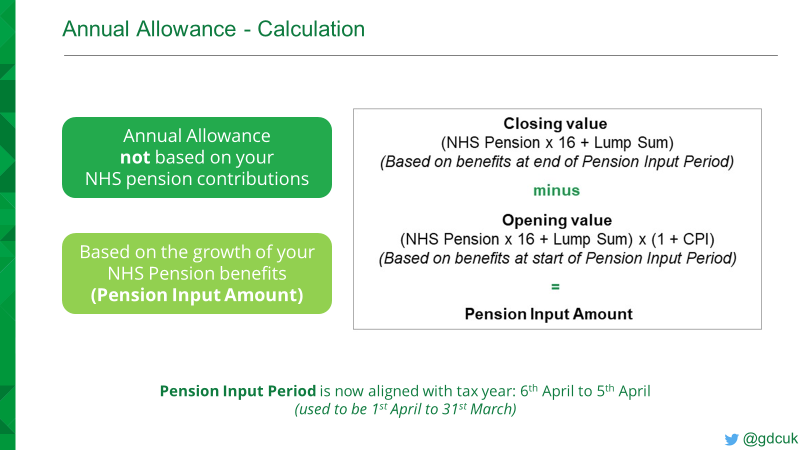
3) Best of Three error
Before June 2020, the 95 scheme AA statements were based on previous year's pensionable pay, rather than 'Best of the last 3 years'
If your pay went down then up again, your AA statement would reflect an artificial pay rise and increased growth 👇
Before June 2020, the 95 scheme AA statements were based on previous year's pensionable pay, rather than 'Best of the last 3 years'
If your pay went down then up again, your AA statement would reflect an artificial pay rise and increased growth 👇

4) Best of Three error
Applying 'Best of Three' gets rid of the artificial growth and in this example, saved £35,380 AA charge 🤯
Revised AA statements for McCloud (covering 2015-2022) should fix this for 2015 members
However, check 2010/11 - 2014/15, to get McCloud ready
Applying 'Best of Three' gets rid of the artificial growth and in this example, saved £35,380 AA charge 🤯
Revised AA statements for McCloud (covering 2015-2022) should fix this for 2015 members
However, check 2010/11 - 2014/15, to get McCloud ready
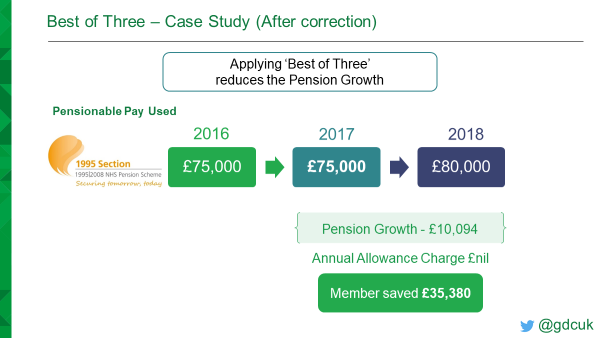
5) Misallocated Arrears error
If you receive pensionable pay arrears for a previous year, then your pension record should be adjusted so that the pay is credited to the correct year
Historic Clinical Excellence Awards are the biggest culprit here (plus backdated On Call pay)
If you receive pensionable pay arrears for a previous year, then your pension record should be adjusted so that the pay is credited to the correct year
Historic Clinical Excellence Awards are the biggest culprit here (plus backdated On Call pay)
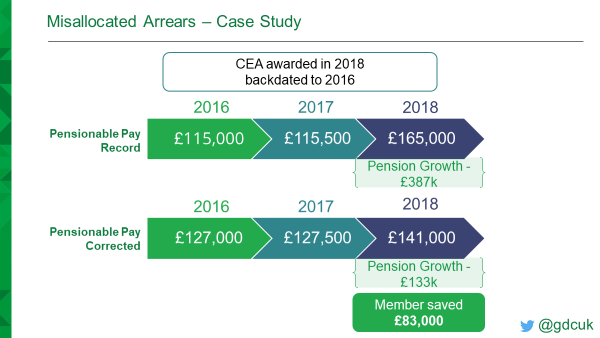
5) Inordinate Pay error
Inordinate rules allow NHSBSA to reduce your pensionable pay at retirement if it is considered too high
I proposed this could apply during member's career - NHSBSA agreed🥳
Can apply if you take on short term work that artificially increases your pay
Inordinate rules allow NHSBSA to reduce your pensionable pay at retirement if it is considered too high
I proposed this could apply during member's career - NHSBSA agreed🥳
Can apply if you take on short term work that artificially increases your pay
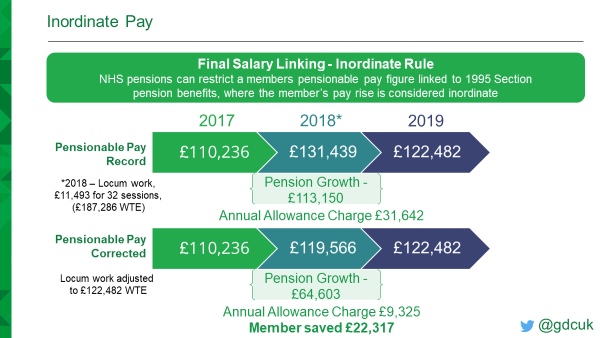
6) Inordinate Pay
There are many members who receive annual allowance charges for pension benefits that never manifest
Whilst not an "error", I've proposed to NHSBSA that inordinate rules be extended to ameliorate this - just awaiting response from DHSC
There are many members who receive annual allowance charges for pension benefits that never manifest
Whilst not an "error", I've proposed to NHSBSA that inordinate rules be extended to ameliorate this - just awaiting response from DHSC
https://twitter.com/gdcuk/status/1469952476866658304?s=20&t=Ih0d8Fk4dOBYxLSp97KrDw
7) Carry Forward error
Not really a pension record error
You can carry forward 3 years unused Annual Allowance, but those years are impacted by the years before them
You need to use your growth figures back to 2010/11 (you'll also need them for the McCloud AA re-assessment)
Not really a pension record error
You can carry forward 3 years unused Annual Allowance, but those years are impacted by the years before them
You need to use your growth figures back to 2010/11 (you'll also need them for the McCloud AA re-assessment)
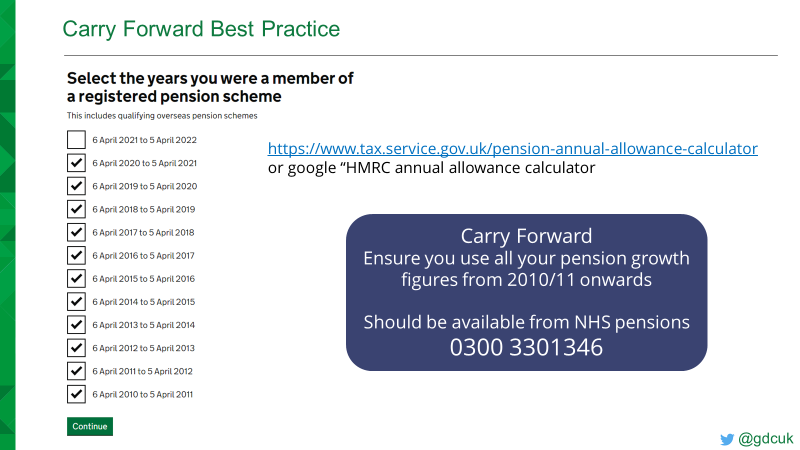
7) Hokey Cokey error
When opting out & re-joining within the same year, sometimes the pre-opt out pay on your record is added again to the pay after you re-join
Easy way to check - compare total pensionable pay on your March payslip against the TRS
When opting out & re-joining within the same year, sometimes the pre-opt out pay on your record is added again to the pay after you re-join
Easy way to check - compare total pensionable pay on your March payslip against the TRS
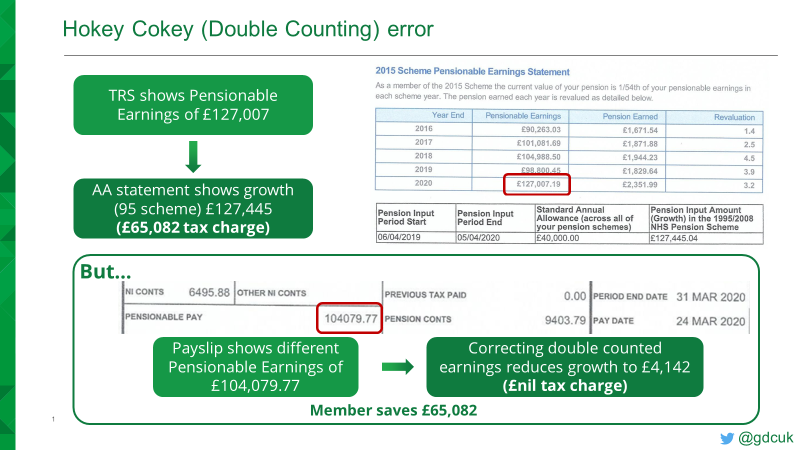
8) Less Than Full Time Standard Contract error
Pay contracts are recorded based on either Sessions (typically 10 per week) or Hours (typically 37.5 per week)
If the standard contract is recorded incorrectly this can artificially inflate your pensionable pay (& AA Charge)
Pay contracts are recorded based on either Sessions (typically 10 per week) or Hours (typically 37.5 per week)
If the standard contract is recorded incorrectly this can artificially inflate your pensionable pay (& AA Charge)
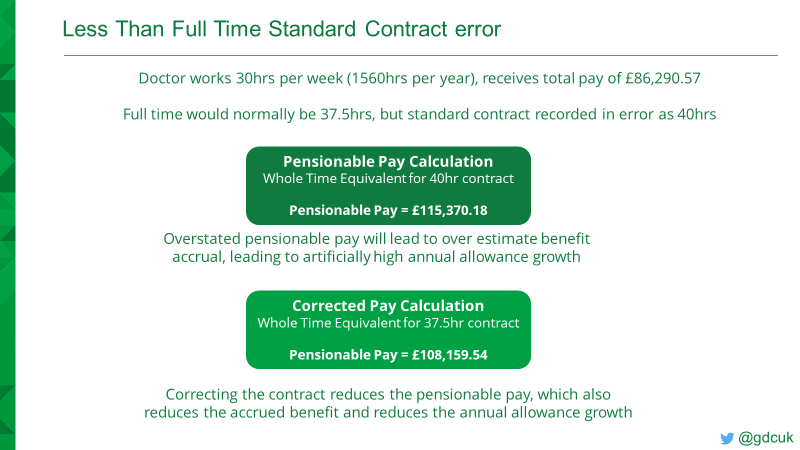
9) GP (with part time Officer) Wrong Contract error
If you work sessions, but your contract has been recorded as hours, this can artificially inflate your pensionable pay, which ultimately artificially increase your annual allowance charge
If you work sessions, but your contract has been recorded as hours, this can artificially inflate your pensionable pay, which ultimately artificially increase your annual allowance charge
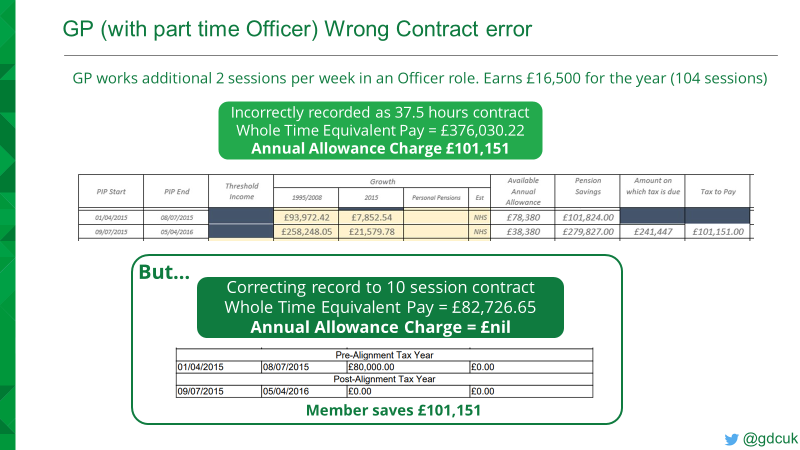
10) Incorrect Return Date error
Pensionable pay is based on chunks of 365 days active service
If the wrong date of return is used with the correct pensionable pay, you can end up with artificially high pay, leading to higher growth and AA charges
Pensionable pay is based on chunks of 365 days active service
If the wrong date of return is used with the correct pensionable pay, you can end up with artificially high pay, leading to higher growth and AA charges
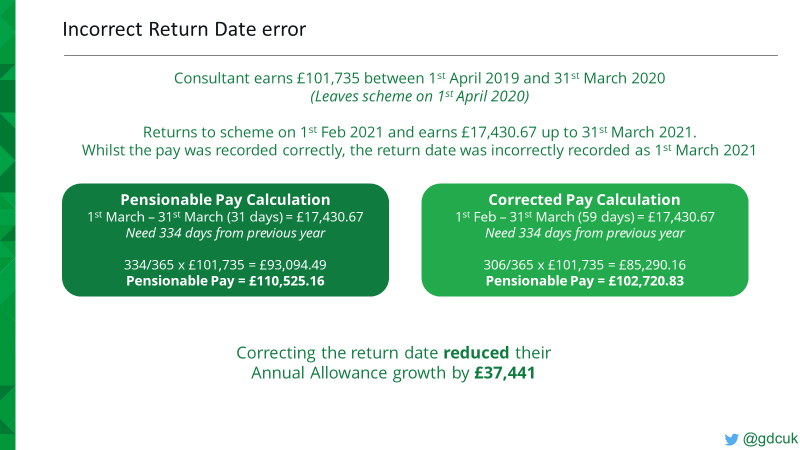
11) Exceeding Full Time error
When a member has multiple Less Than Full Time roles that add up to more than 10 PAs, errors can creep in if both employers pension each role
The record can be trimmed by NHSBSA, but this can sometimes lead to artificially high pay & AA charges
When a member has multiple Less Than Full Time roles that add up to more than 10 PAs, errors can creep in if both employers pension each role
The record can be trimmed by NHSBSA, but this can sometimes lead to artificially high pay & AA charges
12) Incorrect Management Responsibility error
Some historic management responsibilities that should have been pensionable were recorded as non-pensionable
This leads to reduced benefits, impacting lifetime allowance protection & AA charges
Good case study with @DB_Wales👇
Some historic management responsibilities that should have been pensionable were recorded as non-pensionable
This leads to reduced benefits, impacting lifetime allowance protection & AA charges
Good case study with @DB_Wales👇
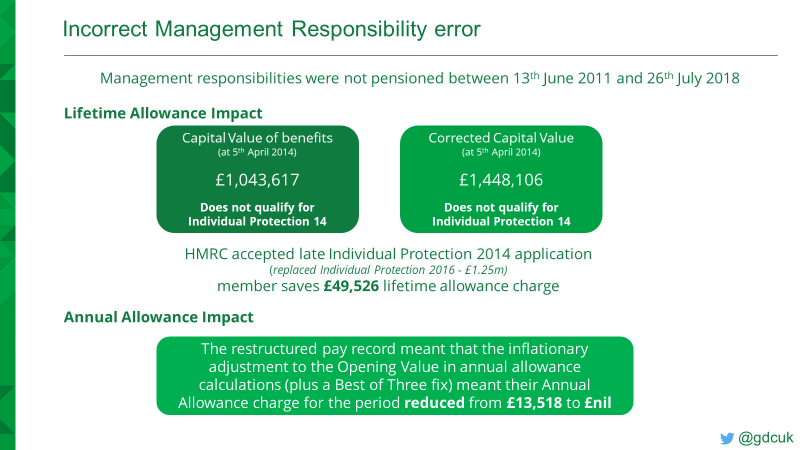
13) Incorrect Increment error
Errors can occur with recording the correct increment progression (particularly new consultants or when moving to/from University employer)
Can sometimes leave the consultant on a lower salary
I have corrected some records going back 5+ years🤯
Errors can occur with recording the correct increment progression (particularly new consultants or when moving to/from University employer)
Can sometimes leave the consultant on a lower salary
I have corrected some records going back 5+ years🤯
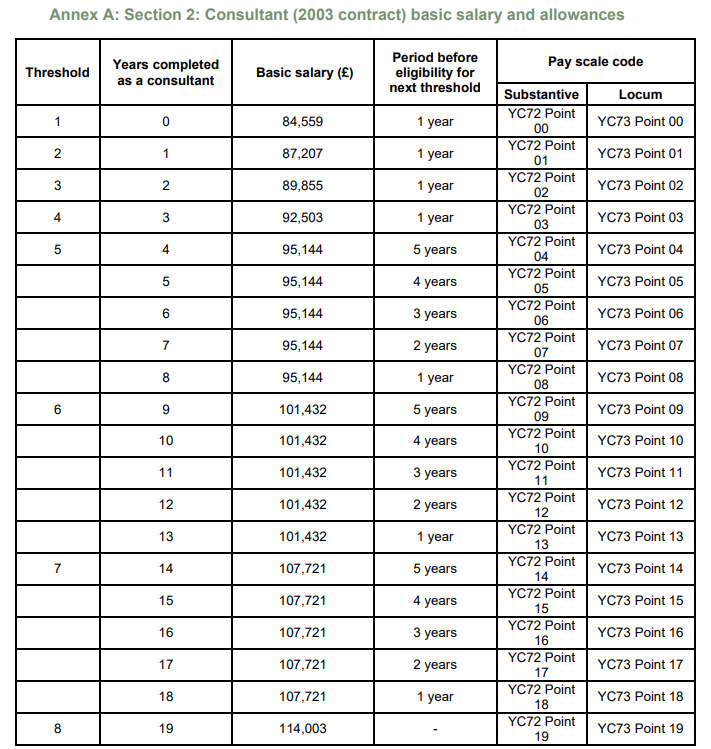
14) Incorrect On Call error
This is where member is paid the 'Cat B' on call rate, when working under 'Cat A' definition
Also On Call payment is a percentage of basic pay, sometimes this has been inflated to include CEA payments
This is where member is paid the 'Cat B' on call rate, when working under 'Cat A' definition
Also On Call payment is a percentage of basic pay, sometimes this has been inflated to include CEA payments
15) Incorrect Added Years errors
Sometimes added years payments are collected, but the contract has not been reflected on the Annual Allowance statement or TRS
Some have their contract ceased (as out the scheme for 12 months+) but payments still being collected on re-joining
Sometimes added years payments are collected, but the contract has not been reflected on the Annual Allowance statement or TRS
Some have their contract ceased (as out the scheme for 12 months+) but payments still being collected on re-joining
16) University / Direction Status Employer errors
Employer typically has no direct access to pension record, so data can get lost / mistyped when the data is transferred to NHSBSA and manually rekeyed
Employer typically has no direct access to pension record, so data can get lost / mistyped when the data is transferred to NHSBSA and manually rekeyed
17) National Clinical Excellence Awards enhancement error
Occurs where member receives full NCEA, but works less than full time - particularly in University sector
Whole Time Equivalent calculations result in increasing pensionable value of the NCEA
(saved £54k AA fixing this)
Occurs where member receives full NCEA, but works less than full time - particularly in University sector
Whole Time Equivalent calculations result in increasing pensionable value of the NCEA
(saved £54k AA fixing this)
18) Missing MHO / Special Class status
Occurs where 1 or many historic employments miss the correct MHO/SC status
Can result in the wrong doubling date for MHO (resulting in less benefit)
Worse cases can result in unnecessary actuarial reduction at 55
Occurs where 1 or many historic employments miss the correct MHO/SC status
Can result in the wrong doubling date for MHO (resulting in less benefit)
Worse cases can result in unnecessary actuarial reduction at 55
19) GP pension record errors
Too many issues to mention in one tweet over the handling of GP pension data and the subsequent errors that occur with Annual Allowance amongst many things
Some great work by @nick_grundy shining a light on these issues
Too many issues to mention in one tweet over the handling of GP pension data and the subsequent errors that occur with Annual Allowance amongst many things
Some great work by @nick_grundy shining a light on these issues
https://twitter.com/nick_grundy/status/1372844086797930496?s=20&t=NOkYxV46zJlCsFtsOXpfaQ
20) The cost of errors is astounding
I've worked with many doctors, nurses, accountants & advisers, fixed well over £1m AA errors (£11m LTA)
AA is not fit for purpose, I hope a fix will come🤞
But, we still have to deal with the current set up, so check your pension record👍
I've worked with many doctors, nurses, accountants & advisers, fixed well over £1m AA errors (£11m LTA)
AA is not fit for purpose, I hope a fix will come🤞
But, we still have to deal with the current set up, so check your pension record👍
• • •
Missing some Tweet in this thread? You can try to
force a refresh


